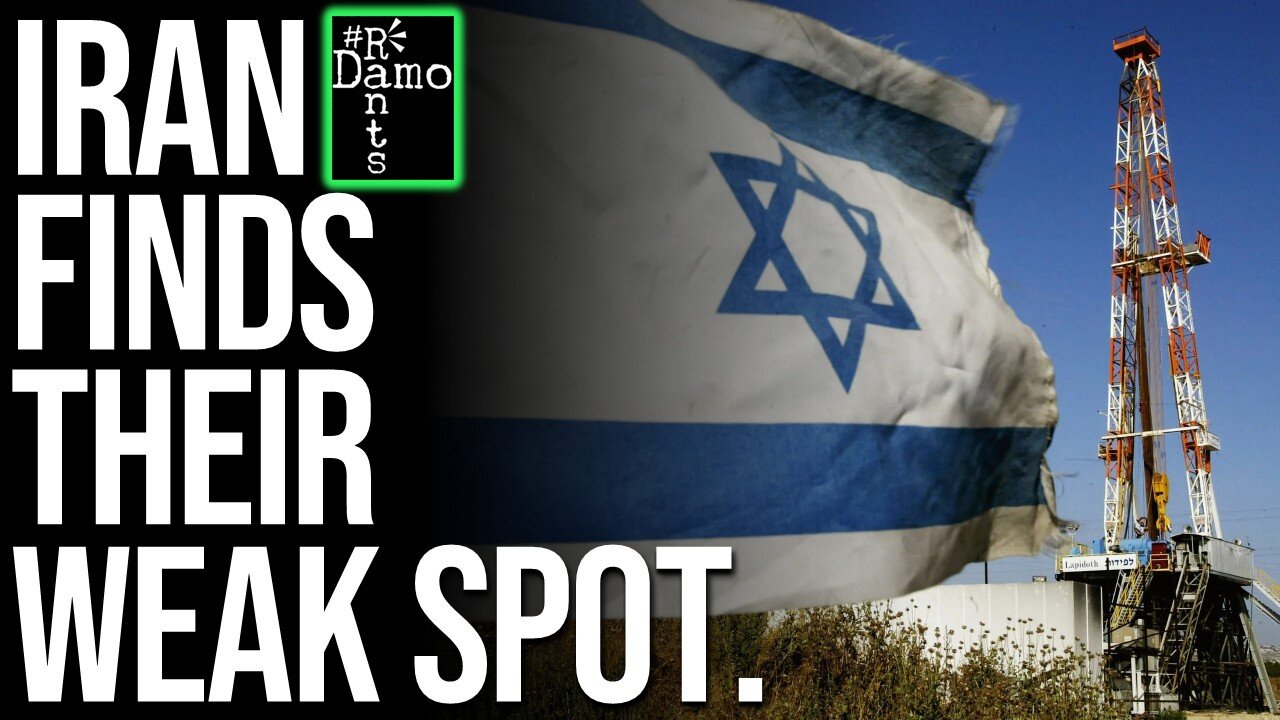Premium Only Content

Power Has Its Limits — Iran Just Showed Israel Theirs
Right, so Iran hasn’t touched a tanker in months, hasn’t so much as nudged the Strait of Hormuz while the Houthis turned the Red Sea into a scrapyard, hasn’t taken the bait as the United States shuffled ships around the Gulf pretending it still runs the place. Then an Azerbaijani-linked vessel rolls out of Ajman with thirty thousand tonnes of petrochemicals, flying a Marshall Islands flag that tells you nothing except the owners don’t want you to know who they are, heading for Singapore like every other quietly inconvenient cargo in this region, and suddenly Iran has a court order in its hand and the ship is seized. And you don’t need a conspiracy theory to see the pressure point. Azerbaijan supplies Israel with a big old chunk of its oil. The United States just moved into the Caucasus as Azerbaijan opened the door, to now sit on Iran’s northern border. Iran can count. So is this about Azerbaijan? About Israel and its oil supply? Or is it a bit of both?
Right, so Iran has spent months sitting on its hands in the Strait of Hormuz, the tiny passage out of the Arabian Gulf, that sees a fifth of all global oil transfers pass through it, even as half the region burned, even as the United States moved forces around the Gulf, even as the Houthis shut down the Red Sea shipping lane with more success than any Western naval coalition wants to admit, and even as Israel leaned harder than usual on its friends in the Caucasus and the Gulf to keep its logistics stable. Keep that oil flowing from Azerbaijan, through Georgia and Turkey to the port of Ashkelon. Iran kept quiet, which is unusual, because the one thing Iran never does lightly is let foreign ships sail through the narrowest choke point on its coastline without reminding the world that it can flick the lane open or shut whenever it feels the need. Then this ship in question comes through. The Talara. One tanker. Marshall Islands flagged. Carrying petrochemicals, high-sulfur gas oil to be exact, used in power plants and boilers. It had departed from the port of Ajman in the UAE. Bound for Singapore. Registered through the usual offshore shells. And Iranian forces diverted it into their waters under a court order. That court order matters, because Iran only bothers with domestic legal cover when it plans to hold something. And if you look at who the ship is linked to, who benefits from that cargo, and which of Iran’s regional irritations the ship sits across, the picture gets a little bit sharper, because this vessel isn’t just a random stop on a busy shipping corridor. It carries lines to Azerbaijan. And Azerbaijan’s link to Israel’s oil supply has never been a secret.
The point here isn’t to pretend Iran stood up at a press conference and declared a campaign against Israel’s energy imports. They didn’t. They rarely say the quiet part out loud. The point is to look at the map that sits behind this seizure, the politics that sit behind the map, the way power moves through shipping lanes, and the way Iran reacts when a cargo, a company, or a corridor crosses one of its unspoken lines. Because Iran’s maritime behaviour is predictable when you step back far enough to see the pattern. They seize vessels for three reasons. Retaliation. Sanctions enforcement. Strategic signalling. And none of those things happen casually. None of those things happen without a shift on the ground or an itch inside the system that Tehran decides to scratch. And when they choose a tanker linked to Azerbaijan, at the exact moment Azerbaijan deepens its alignment with Israel and hands the United States new leverage through the Armenia corridor, you’d be daft not to ask what signal Iran thinks it’s sending here.
You can start with the facts we know. We know the vessel was carrying around thirty thousand tonnes of petrochemicals, left Ajman in the UAE, and was headed to Singapore. The United States said Iranian forces forced it into Iranian waters. Iran said there was a court order and illegal cargo. The ship was flagged in the Marshall Islands. The route is one of the busiest petrochemical chains in the world. None of that is extraordinary. What is extraordinary is the timing. Iran hasn’t been holding tankers in the Strait for months, not even when the United States and Israel were at their loudest over missile exchanges, not even when the UAE was running political favours across half the region, not even when Iran’s own assets were hit in Syria and Iraq. Tehran held its line. They let the Houthis carry the maritime weight in the Red Sea, which suited Iran fine because the cost was someone else’s to absorb. But Hormuz is Iran’s home field and when Iran acts at home, it always means something.
If you want to know why this ship matters, you need to look north. Azerbaijan sits on Iran’s border, and Iran has spent years accusing Baku of hosting Israeli intelligence services, allowing surveillance platforms on its territory, and quietly supporting the Israeli military campaign by supplying Israel with a substantial portion of its oil, estimates state that Azerbaijan supplies roughly 40% of Israel’s oil. Azerbaijan never denies it because it suits them. Israel doesn’t advertise it because half its propaganda relies on pretending it’s energy independent, when actually it depends on supply lines running through states that don’t want that dependency spoken about, like Turkey. And Iran doesn’t forget it because petroleum flows are power, and Tehran has lived long enough under sanctions to know that an enemy’s energy lifeline can matter more than any speech on the floor of the Knesset. When Iran sees an Azerbaijani-linked tanker coming out of the UAE on a petrochemical route, heading for a port that blends and redistributes cargo across Asia, it knows what that looks like. It knows how often those routes are used to move repackaged or misdeclared product. And it knows that Azerbaijan sits inside a political triangle with Israel and the United States that has closed in on Iran’s northern flank since the Zangezur corridor became a Washington-backed project earlier this year.
The significance of Zangezur isn’t that it’s a road. It’s that it gives the United States a new influence line across the Caucasus, at a time when Russia is too preoccupied to keep a firm grip on the region. Iran warned repeatedly that external actors should stay out of its neighbourhood. Nobody listened. Azerbaijan and Armenia struck a corridor deal backed by the United States. And Iran was left watching Washington gain a foothold a few dozen miles from its border. Iran does not take kindly to being surrounded. And Iran certainly doesn’t take kindly to seeing an ally of Israel hand the United States a transport corridor that could someday be used for energy diversification or military logistics or any other form of American presence Iran has spent decades trying to keep out.
So yes, when you put all that together, Iran seizing a tanker with ties to Azerbaijan suddenly doesn’t look that random. It looks like a message. Iran may be signalling that if Baku wants to play logistics chess with the United States and keep feeding Israel’s energy systems, Iran has other ways of reminding them who sits on the world’s most sensitive choke point. Tehran doesn’t have to hit Azerbaijan directly. It doesn’t have to hit Israel directly. It can hit the middle. It can hit the grey zone of ownership where vessels are flagged in the Marshall Islands, insured in Europe, crewed in South Asia, owned by a tangle of offshore shells, and moving product that often has more political fingerprints on it than the paperwork admits.
And then there’s the UAE. The UAE ports are the throat of half the region’s covert trade. They’re also one of Israel’s most reliable partners since the Abraham Accords. They’re investing heavily in Port Sudan. They’re entangled in Sudan’s genocide, backing the Rapid Support Forces with arms, according to UN experts. And they’ve been a convenient stop for supply routes that don’t want to cross the Red Sea now that the Houthis have put half the shipping industry on notice, albeit not an issue right at this moment, having ceased such obstruction for as long as the Gaza ceasefire holds. None of that means this tanker was part of a bypass chain for Israeli goods. There’s no evidence for that. But the UAE’s role in these networks isn’t subtle and Tehran knows it. So when a tanker leaves Ajman with petrochemicals and heads into Hormuz, Iran isn’t just seeing a vessel. It’s seeing the political ecosystem the vessel sits inside. The UAE’s alignment with Israel. The UAE’s dependency on American security guarantees. The UAE’s willingness to let its ports act as transit points for supply chains that shift depending on which lane is blocked by which conflict. Iran sees all of that. And Iran doesn’t forget that the UAE signed up to the American-led maritime surveillance networks that have spent years circling Iranian waters under the name of “stability”.
The cargo matters too. Thirty thousand tonnes of petrochemicals is not trivial, if indeed that is what is actually on board. Iran is deeply sensitive to petrochemical smuggling because sanctions push its own industry into shadow channels. Some tankers carry Iranian-origin material disguised as Emirati. Some carry legitimate product that Iran claims violates its laws because it was transferred in disputed waters. Some carry misdeclared cargoes that get caught up in Iranian enforcement because offshore brokers cut corners. Iran has seized similar ships before when they suspected smuggling. And when they invoke a judicial order, it usually means the state intends to hold the vessel until the courts wrap themselves around the paperwork, which can take months. Courts are used as political cover. It isn’t about justice. It’s about process. It’s about giving Tehran leverage. And it’s about making sure the message lands that Iran can enforce its view of legality in waters other states pretend are global highways.
So the question becomes whether this vessel was chosen because of its cargo or because of its connections. The answer might be both. Iran can use sanctions enforcement as a legitimate claim while also knowing that the beneficial ownership structure leads back to a state Tehran distrusts. And that’s the political sweet spot for Iran. They get to say they’re just enforcing maritime law. They get to hold a shipment. They get to pressure a company. And they get to let Azerbaijan, Israel, and the United States read the deeper meaning without ever saying it out loud.
If you want another angle, look at Hormuz itself. The Strait carries about twenty percent of the world’s oil, and every insurance firm knows it. When Iran touches a ship there, insurers move. Premiums rise. Risk tables change. The cost of moving energy through the Gulf shifts. That cost flows back into the pockets of every state that depends on those lanes. Israel depends on them. The UAE depends on them. The United States depends on them. Iran knows all that, because Iran has spent forty years being told by Western think tanks that closing Hormuz would collapse the global economy. So Iran doesn’t close it. Iran taps it. And every tap sends a reminder that the real balance of power in this region is not held by the states with aircraft carriers. It’s held by the state with a coastline wrapped around the most important waterway on earth.
There’s also the broader strategic shift. The Red Sea has been turned into a confrontation zone by the Houthis, whose blockade has forced the shipping industry to choose between paying ludicrous insurance premiums, taking the long route around Africa, or hoping the United States and its partners finally figure out that drone-launchers in Yemen don’t care how many admiralty flags the West puts on its patrols. The point is: with the Red Sea frozen for Western shipping, thawed right now, but that can change at any time and shipping has to keep that in mind, the Gulf becomes even more important. And Iran knows that. Iran can look at global logistics and understand that one well-placed enforcement action can push freight patterns, cost structures, and political nerves in a way that costs Iran almost nothing.
Then there’s the Singapore piece. Singapore isn’t a political actor in this story. But Singapore is a refinery and trading hub. It’s where petrochemicals go to be blended, rebadged, re-exported, or redistributed. It’s a node in the global system that doesn’t think about Middle Eastern politics until the politics lands in its paperwork. So when a disputed or suspicious cargo is headed for Singapore, Iran knows the cargo may be part of a larger chain. It doesn’t need to know every step. It just needs to know the pattern. And the pattern here is familiar: a UAE departure, an Asian destination, a flag of convenience, and a cargo type Iran has seized before.
By the time you pull back far enough to see all the strands, the seizure starts looking less like a one-off incident and more like a calibrated pressure point. Iran has been quiet for months. Iran has watched Azerbaijan and Israel tighten ties. Iran has watched the United States insert itself into the Caucasus. Iran has watched the UAE deepen its regional bets. Iran has watched Singapore act as a neutral endpoint for petrochemicals that move along chains Tehran doesn’t fully trust. And Iran has watched insurers and logistics firms pray that Hormuz stays quiet because the Red Sea is still not a safe bet. So Iran acted. Not explosively. Not recklessly. But strategically.
This doesn’t mean Iran has launched a maritime campaign. There’s no evidence of that, at least not yet, more seizures would lend more credence to that thinking. But it does mean Iran has chosen a moment to let all the relevant actors know that it still holds the cards that matter in the one choke point the West can’t secure without Iran’s consent. If Azerbaijan wants to act like an extension of Israel’s energy network, Iran can disrupt that network. If the United States wants to push into the Caucasus, Iran can push back in Hormuz. If the UAE wants to keep running supply networks that benefit its partners, Iran can put a hand on the tap. If Singapore wants to keep its distance from this region’s politics, it can’t avoid the fallout when cargoes become contested. None of this is dramatic. None of it needs to be. That’s the point. Iran doesn’t need a war. It needs leverage. And in this part of the world, leverage looks like a tanker quietly changing course under the watch of a state that remembers every slight, every alliance, every corridor deal, and every pipeline plan that threatens its security.
So you come back to the question: is Iran quietly targeting Israel’s oil lifeline? The honest answer is that Iran hasn’t said it, hasn’t declared it, hasn’t put it on a banner or a spokesman’s notes. But Iran has acted in a way that fits a clear geopolitical logic. Iran sees Azerbaijan as part of Israel’s supply system. Iran sees the United States moving into the Caucasus. Iran sees the UAE entangling itself in conflicts that serve Western and Israeli interests. Iran sees cargo routes that blend politics with petrochemicals. And Iran sees a world where maritime pressure has become a more efficient tool than any missile salvo could ever possibly be. So Iran chose a ship that sits on those lines and pulled it out of circulation. Iran knows exactly who will feel that move. And Iran knows exactly what that reminder is worth.
That’s the verdict. Iran didn’t need to say the words. The seizure when you break all of these things down, actually says it all.
Of course whilst this move very much does speak louder than any missile salvo, its not like we don’t know Iran can launch the odd missile salvo or two is it, Israel learnt that back in June when they got an absolute spanking for picking a fight they couldn’t possibly win. Well now they’ve announced a new missile, and the range on it should have more than just Israel worried, but those shamelessly backing them from further away too, so get all the details of that story here.
Please do also hit like, share and subscribe if you haven’t done so already so as to ensure you don’t miss out on all new daily content as well as spreading the word and helping to support the channel at the same time which is very much appreciated, holding power to account for ordinary working class people and I will hopefully catch you on the next one. Cheers folks.
-
 1:19:32
1:19:32
Kim Iversen
3 hours agoIsrael Running The Dept Of Homeland Security Social?!?
29.9K58 -
 LIVE
LIVE
Akademiks
2 hours agoSheck Wes exposes Fake Industry. Future Not supportin his mans? D4VD had help w disposing his ex?
939 watching -
 DVR
DVR
The Trish Regan Show
3 hours agoJUST IN: ABC HIRES Marjorie Taylor Greene for ‘The View’?! Hosts FREAKING OUT Over Being REPLACED!
24.9K7 -
 22:02
22:02
We Got Receipts
7 hours agoIt just got WORSE for Democrats…
16.4K11 -
 4:15
4:15
Captain Peach
10 days ago $1.52 earned5 Ways Games Trick You Into Buying
17.6K3 -
 1:00:30
1:00:30
Based Campwith Simone and Malcolm
4 days agoYou Think You Hate The Media ... You Don't Hate Them Enough
14.1K2 -
 1:03:11
1:03:11
The Amber May Show
5 hours agoAmerica’s Spiritual Shake-Up: From Pews to Paganism?
6.83K2 -
 1:16:27
1:16:27
Redacted News
4 hours agoYou Won't BELIEVE what is happening in America right now... It's SHOCKING
121K126 -
 1:38:07
1:38:07
vivafrei
5 hours agoLive with Ivan Raiklin! Jan. 6 Pipe Bomber~! Comey & Letitia James Charges Dropped! AND MORE!
83.9K56 -
 1:22:52
1:22:52
Russell Brand
5 hours agoThey’re Running Out of Road — The Scandals, Experiments & Numbers They Can’t Hide - SF654
112K6